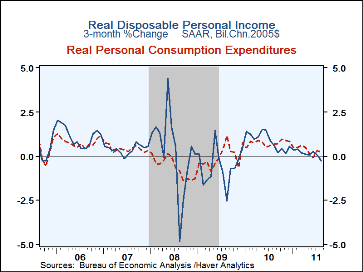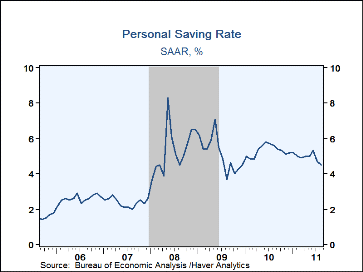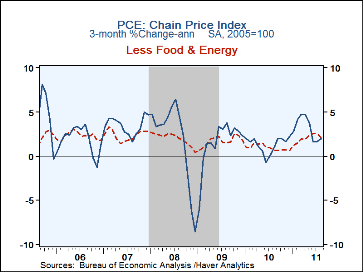 Global| Sep 30 2011
Global| Sep 30 2011U.S. Personal Income Falls
by:Tom Moeller
|in:Economy in Brief
Summary
A one-month decline and a trend slowdown characterize the recent behavior of personal income. It fell 0.1% during August following a revised 0.1% July uptick, initially reported as 0.3%. A 0.1% gain was expected. Disposable income [...]
 A one-month decline and a trend slowdown characterize
the recent behavior of personal income. It
fell 0.1% during August following a revised 0.1% July uptick,
initially reported as 0.3%. A 0.1% gain was expected. Disposable
income also slipped marginally following the 0.1% July gain. Behind these
slim changes is a slowdown in three-month growth in income to 0.2% versus
its peak of 2.3% during February. Growth in take-home pay also slowed to
0.2% during the last three months from its February peak of 1.4%. The
picture of real spending power is worse. When adjusted for prices,
disposable income fell 0.3% since May.
A one-month decline and a trend slowdown characterize
the recent behavior of personal income. It
fell 0.1% during August following a revised 0.1% July uptick,
initially reported as 0.3%. A 0.1% gain was expected. Disposable
income also slipped marginally following the 0.1% July gain. Behind these
slim changes is a slowdown in three-month growth in income to 0.2% versus
its peak of 2.3% during February. Growth in take-home pay also slowed to
0.2% during the last three months from its February peak of 1.4%. The
picture of real spending power is worse. When adjusted for prices,
disposable income fell 0.3% since May.
The weak labor market caused a 0.2% decline (+3.3% y/y) in wages & salaries during August after a 0.3% July gain. Amongst other categories, the most pronounced increase was in rental income. It surged another 2.1% (16.8% y/y) after a 2.0% July jump. Proprietors' income gained 0.6% (5.5% y/y). Transfer payments fell 0.3% and the slower y/y increase of 1.6% contrasted to 13.8% in 2009, lifted then by the poor job market. A better economy also raised dividend income last month by another 0.8% (8.5% y/y) following last year's 19.9% jump. Interest income fell 1.2% (+1.3% y/y). That followed a 9.5% decline last year and a 19.8% drop in 2009.
Personal consumption expenditures matched expectations and rose 0.2% during August, after a little-revised 0.7% July increase. Spending on durable goods slipped 0.1% (+6.5% y/y) after a 2.2% July surge. Three-month growth remained a moderate 3.0%, down versus 5.4% last year. Outlays on motor vehicles fell 0.7% last month (+9.5% y/y) after the rebate-charged 5.7% July jump. Spending on furniture slipped 0.2% (+3.6% y/y) and apparel fell 0.8% (+4.0% y/y). Services spending rose 0.2% (3.4% y/y), paced by a 5.3% annual increase in food services & accommodations and a 4.8% annual increase in financial services. In constant dollars, real personal consumption expenditures slipped marginally (+1.8% y/y) after a 0.4% July gain that was half the 0.8% reported initially.
The personal savings rate fell to 4.5% as spending outpaced income. The latest was the lowest since December, 2009.
The PCE chain price index rose 0.2% last month (2.9% y/y) as the rise in gasoline prices moderated to 1.6%. However, the gas price index rose nearly one-third y/y. The core PCE price deflator inched up just 0.1% and by 1.6% y/y. That's up from the record low year-to-year change of 0.9% reached this past December. Notable amongst the categories was a 4.8% y/y jump in food & beverages, a 3.7% y/y increase in motor vehicles and a 3.1% y/y gain in food services & accommodations.
The personal income & consumption figures are available in Haver's USECON and USNA databases. The expectations figures are in the AS1REPNA database.
The Productivity Slowdown Reaffirmed from the Federal Reserve Bank of New York is available here.
| Personal Income & Outlays (%) | Aug | Jul | Jun | Y/Y | 2010 | 2009 | 2008 |
|---|---|---|---|---|---|---|---|
| Personal Income | -0.1 | 0.1 | 0.2 | 4.5 | 3.7 | -4.3 | 4.6 |
| Wages & Salaries | -0.2 | 0.3 | 0.1 | 3.3 | 2.2 | -4.3 | 2.0 |
| Disposable Personal Income | -0.0 | 0.1 | 0.1 | 3.2 | 3.6 | -2.1 | 5.8 |
| Personal Consumption Expenditures | 0.2 | 0.7 | -0.2 | 4.7 | 3.8 | -1.7 | 2.7 |
| Saving Rate | 4.5 | 4.7 | 5.3 | 5.6 (Aug'10) |
5.3 | 5.1 | 5.4 |
| PCE Chain Price Index | 0.2 | 0.4 | -0.1 | 2.9 | 1.8 | 0.2 | 3.3 |
| Less Food & Energy | 0.1 | 0.2 | 0.2 | 1.6 | 1.4 | 1.6 | 2.3 |
| Real Disposable Income | -0.3 | -0.2 | 0.3 | 0.3 | 1.8 | -2.3 | 2.4 |
| Real Personal Consumption Expenditures | -0.0 | 0.3 | -0.1 | 1.8 | 2.0 | -1.9 | -0.6 |
Tom Moeller
AuthorMore in Author Profile »Prior to joining Haver Analytics in 2000, Mr. Moeller worked as the Economist at Chancellor Capital Management from 1985 to 1999. There, he developed comprehensive economic forecasts and interpreted economic data for equity and fixed income portfolio managers. Also at Chancellor, Mr. Moeller worked as an equity analyst and was responsible for researching and rating companies in the economically sensitive automobile and housing industries for investment in Chancellor’s equity portfolio. Prior to joining Chancellor, Mr. Moeller was an Economist at Citibank from 1979 to 1984. He also analyzed pricing behavior in the metals industry for the Council on Wage and Price Stability in Washington, D.C. In 1999, Mr. Moeller received the award for most accurate forecast from the Forecasters' Club of New York. From 1990 to 1992 he was President of the New York Association for Business Economists. Mr. Moeller earned an M.B.A. in Finance from Fordham University, where he graduated in 1987. He holds a Bachelor of Arts in Economics from George Washington University.
More Economy in Brief
 Global| Feb 05 2026
Global| Feb 05 2026Charts of the Week: Balanced Policy, Resilient Data and AI Narratives
by:Andrew Cates








